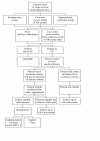Protocol for Birmingham Atrial Fibrillation Treatment of the Aged study (BAFTA): a randomised controlled trial of warfarin versus aspirin for stroke prevention in the management of atrial fibrillation in an elderly primary care population [ISRCTN89345269]
- PMID: 12939169
- PMCID: PMC201020
- DOI: 10.1186/1471-2261-3-9
Protocol for Birmingham Atrial Fibrillation Treatment of the Aged study (BAFTA): a randomised controlled trial of warfarin versus aspirin for stroke prevention in the management of atrial fibrillation in an elderly primary care population [ISRCTN89345269]
Abstract
Background: Atrial fibrillation (AF) is an important independent risk factor for stroke. Randomised controlled trials have shown that this risk can be reduced substantially by treatment with warfarin or more modestly by treatment with aspirin. Existing trial data for the effectiveness of warfarin are drawn largely from studies in selected secondary care populations that under-represent the elderly. The Birmingham Atrial Fibrillation Treatment of the Aged (BAFTA) study will provide evidence of the risks and benefits of warfarin versus aspirin for the prevention of stroke for older people with AF in a primary care setting.
Study design: A randomised controlled trial where older patients with AF are randomised to receive adjusted dose warfarin or aspirin. Patients will be followed up at three months post-randomisation, then at six monthly intervals there after for an average of three years by their general practitioner. Patients will also receive an annual health questionnaire.1240 patients will be recruited from over 200 practices in England. Patients must be aged 75 years or over and have AF. Patients will be excluded if they have a history of any of the following conditions: rheumatic heart disease; major non-traumatic haemorrhage; intra-cranial haemorrhage; oesophageal varices; active endoscopically proven peptic ulcer disease; allergic hypersensitivity to warfarin or aspirin; or terminal illness. Patients will also be excluded if the GP considers that there are clinical reasons to treat a patient with warfarin in preference to aspirin (or vice versa). The primary end-point is fatal or non-fatal disabling stroke (ischaemic or haemorrhagic) or significant arterial embolism. Secondary outcomes include major extra-cranial haemorrhage, death (all cause, vascular), hospital admissions (all cause, vascular), cognition, quality of life, disability and compliance with study medication.
Figures
Similar articles
-
Adjusted-dose warfarin versus low-intensity, fixed-dose warfarin plus aspirin for high-risk patients with atrial fibrillation: Stroke Prevention in Atrial Fibrillation III randomised clinical trial.Lancet. 1996 Sep 7;348(9028):633-8. Lancet. 1996. PMID: 8782752 Clinical Trial.
-
Warfarin versus aspirin for stroke prevention in an elderly community population with atrial fibrillation (the Birmingham Atrial Fibrillation Treatment of the Aged Study, BAFTA): a randomised controlled trial.Lancet. 2007 Aug 11;370(9586):493-503. doi: 10.1016/S0140-6736(07)61233-1. Lancet. 2007. PMID: 17693178 Clinical Trial.
-
Outcomes of discontinuing rivaroxaban compared with warfarin in patients with nonvalvular atrial fibrillation: analysis from the ROCKET AF trial (Rivaroxaban Once-Daily, Oral, Direct Factor Xa Inhibition Compared With Vitamin K Antagonism for Prevention of Stroke and Embolism Trial in Atrial Fibrillation).J Am Coll Cardiol. 2013 Feb 12;61(6):651-8. doi: 10.1016/j.jacc.2012.09.057. J Am Coll Cardiol. 2013. PMID: 23391196 Clinical Trial.
-
Novel oral anticoagulants for stroke prevention in atrial fibrillation: focus on apixaban.Adv Ther. 2012 Jun;29(6):491-507. doi: 10.1007/s12325-012-0026-8. Epub 2012 Jun 7. Adv Ther. 2012. PMID: 22684583 Review.
-
Current trial-associated outcomes with warfarin in prevention of stroke in patients with nonvalvular atrial fibrillation: a meta-analysis.Arch Intern Med. 2012 Apr 23;172(8):623-31; discussion 631-3. doi: 10.1001/archinternmed.2012.121. Epub 2012 Mar 26. Arch Intern Med. 2012. PMID: 22450212 Review.
Cited by
-
Stroke prevention in atrial fibrillation: putting the guidelines into practice.Drugs Aging. 2010 Nov 1;27(11):859-70. doi: 10.2165/11538620-000000000-00000. Drugs Aging. 2010. PMID: 20964460 Review.
-
Therapeutic management in ambulatory elderly patients with atrial fibrillation: the S.AGES cohort.J Nutr Health Aging. 2015 Feb;19(2):219-27. doi: 10.1007/s12603-015-0444-9. J Nutr Health Aging. 2015. PMID: 25651449
-
Could some geriatric characteristics hinder the prescription of anticoagulants in atrial fibrillation in the elderly?J Aging Res. 2014;2014:693740. doi: 10.1155/2014/693740. Epub 2014 Sep 10. J Aging Res. 2014. PMID: 25295192 Free PMC article.
-
Could geriatric characteristics explain the under-prescription of anticoagulation therapy for older patients admitted with atrial fibrillation? A retrospective observational study.Drugs Aging. 2010 Oct 1;27(10):807-13. doi: 10.2165/11537900-000000000-00000. Drugs Aging. 2010. PMID: 20883061
-
Geriatric Syndromes and Atrial Fibrillation: Prevalence and Association with Anticoagulant Use in a National Cohort of Older Americans.J Am Geriatr Soc. 2021 Feb;69(2):349-356. doi: 10.1111/jgs.16822. Epub 2020 Sep 28. J Am Geriatr Soc. 2021. PMID: 32989731 Free PMC article.
References
-
- Benjamin E, Wolf P, D'Agostino R, Silbershatz H, Kannel W, Levy D. Impact of atrial fibrillation on the risk of death: the Framingham Heart Study. Circulation. 1998;98:946–952. - PubMed
-
- Wolf P, Abbott R, Kannel W. Atrial fibrillation as an independent risk factor for stroke: The Framingham Study. Stroke. 1991;22:983–988. - PubMed
-
- Bamford J, Sandercock P, Dennis M, Burn J, Warlow C. A prospective study of acute cerebrovascular disease in the community: the Oxfordshire Community Stroke Study – 1981–86. Incidence, case fatality rates and overall outcome at one year of cerebral infarction, primary intracerebral and subarachnoid haemorrhage. J Neurol Neurosurg Psychiatry. 1990;53:16–22. - PMC - PubMed
Publication types
MeSH terms
Substances
Associated data
LinkOut - more resources
Full Text Sources
Medical


